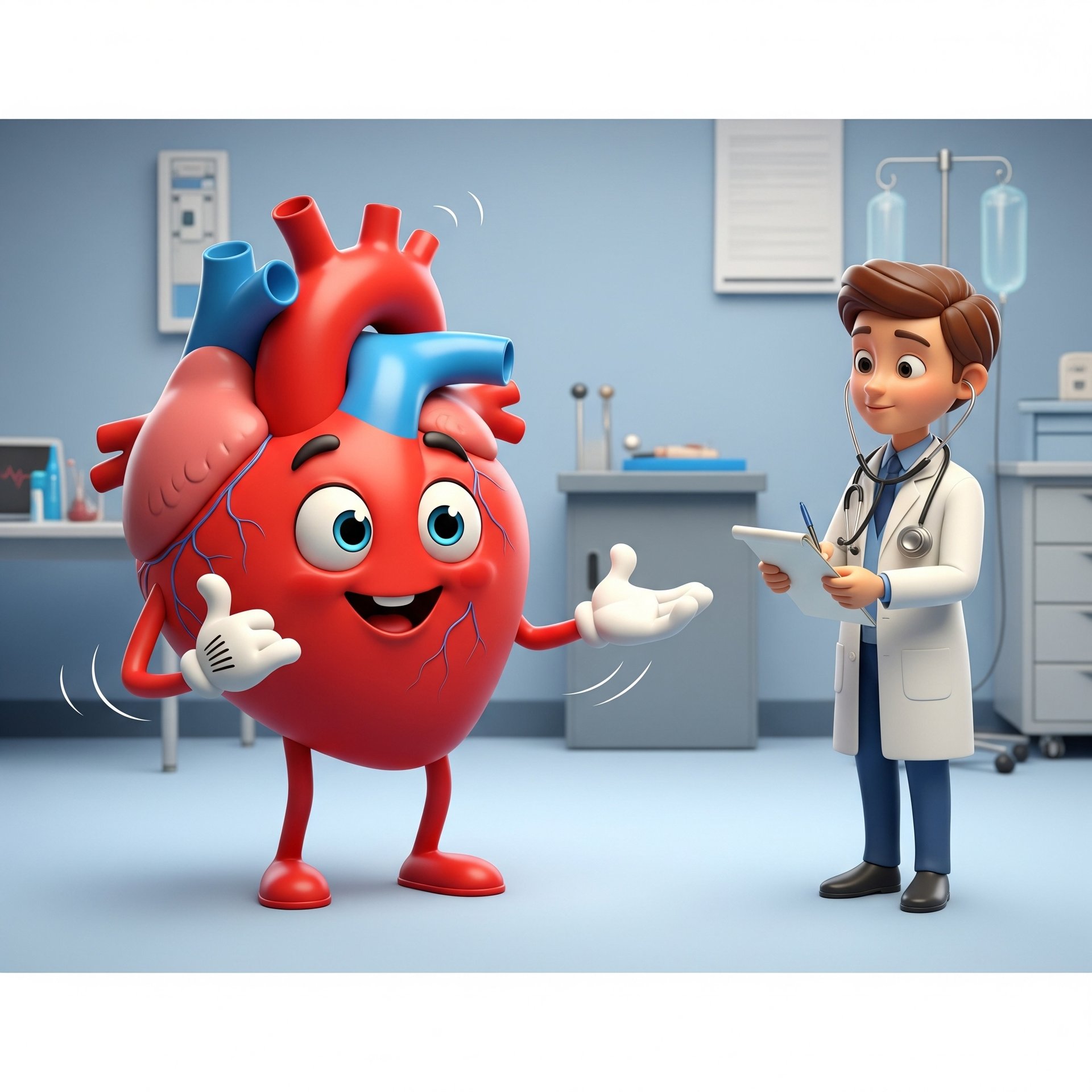THEMEDPRACTICALEXAM.COM

Palpitations History Taking Format
1. Patient Details
Name, Age, Sex, Occupation, Address
2. Presenting Complaint
Palpitations (describe in patient’s own words)
Duration
3. History of Presenting Illness
Onset: Sudden or gradual? When did it start?
Duration: How long do episodes last? Momentary or sustained?
Frequency: How often do the episodes occur?
Character:
How do the palpitations feel? (pounding, fluttering, racing, irregular, skipping beats)
Can the patient tap out the rhythm?
Regular or irregular?
Precipitating factors:
Physical activity, emotional stress, anxiety, caffeine, alcohol, certain positions, medications, sleep deprivation
Relieving factors:
Rest, deep breathing, stopping activity, medications
Associated symptoms:
Chest pain
Breathlessness
Dizziness or lightheadedness
Syncope (fainting)
Sweating
Tremor
Heat intolerance
Weight loss
Anxiety or panic
Previous episodes:
Has this happened before?
Any previous diagnosis or treatment?
4. Past Medical History
Known heart disease (arrhythmia, heart failure, valve disease, congenital heart disease)
Hypertension, diabetes, thyroid disorders, anemia, anxiety disorders
Previous similar symptoms or hospitalizations
5. Drug History
Prescription and over-the-counter medications (including inhalers, decongestants, herbal supplements)
Recent changes in medication
Use of stimulants (caffeine, nicotine, recreational drugs)
6. Personal History
Diet and caffeine intake (tea, coffee, energy drinks)
Alcohol and tobacco use
Exercise habits
Sleep pattern and stress levels
7. Family History
Sudden cardiac death, arrhythmias, syncope, or heart disease in family members
8. Socioeconomic History
Occupation and work-related stress
Living conditions and support system
Access to healthcare
9. Systemic Enquiry
Symptoms of hyperthyroidism (tremor, heat intolerance, weight loss)
Symptoms of anemia (fatigue, pallor)
Symptoms of anxiety or panic disorder

Case History
Personal Details:
Ms. Anjali Sharma, 28-year-old female, software engineer
Presenting Complaint:
Palpitations for 3 weeks
History of Presenting Illness:
Ms. Anjali reports experiencing episodes of “racing heartbeats” for the past 3 weeks. The palpitations have a sudden onset, last for a few minutes, and occur 2–3 times per week. She describes them as fast and regular, sometimes accompanied by a mild sense of chest discomfort and occasional lightheadedness, but no syncope. The episodes are often triggered by emotional stress at work or after consuming coffee, and are relieved by sitting quietly or taking deep breaths. She denies any associated chest pain, breathlessness, sweating, or tremors. She has not noticed any irregularity or skipped beats.
She has not experienced similar episodes in the past and has not sought medical attention before. There is no history of fever, weight loss, or symptoms of hyperthyroidism such as heat intolerance or tremor.
Past Medical History:
No known heart disease, hypertension, diabetes, or thyroid disorder
No previous hospitalizations
Drug History:
Not on any regular medications
Occasionally takes over-the-counter painkillers for headaches
Drinks 2–3 cups of coffee daily
No history of recreational drug use
Personal History:
Diet: Vegetarian, regular meals
Appetite: Normal
Sleep: Often disturbed due to work stress
Physical activity: Sedentary lifestyle
Alcohol: Does not consume
Smoking: Non-smoker
Family History:
No family history of sudden cardiac death, arrhythmias, or heart disease
Socioeconomic History:
Works as a software engineer in a private firm
Lives with parents in an urban area
Middle-class socioeconomic status
Access to regular healthcare
Systemic Enquiry:
No symptoms of hyperthyroidism (no tremor, heat intolerance, or weight loss)
No symptoms of anemia (no fatigue or pallor)
No symptoms of anxiety or panic attacks apart from work-related stress
Case Summary
Ms. Anjali Sharma, a 28-year-old software engineer with no significant past medical or family history, presents with 3 weeks of sudden-onset, brief, regular palpitations triggered by stress or caffeine and relieved by rest. There are no associated symptoms suggestive of structural heart disease, hyperthyroidism, or systemic illness.
Differential Diagnosis
Sinus Tachycardia (due to anxiety or stress):
Likely, given the association with emotional stress and absence of other symptoms.
Supraventricular Tachycardia (SVT):
Possible, as episodes are sudden in onset and regular, though usually more symptomatic.
Caffeine-induced Palpitations:
Possible, given regular coffee intake and temporal relation to episodes.
Panic Attacks/Anxiety Disorder:
Could present with palpitations, but she does not report other anxiety symptoms.
Premature Atrial or Ventricular Contractions (PACs/PVCs):
Less likely as she does not describe “skipped beats” or irregularity.
Hyperthyroidism:
Unlikely, as there are no other supporting symptoms.
Other Arrhythmias:
Less likely in the absence of structural heart disease, but should be considered if symptoms worsen or persist.

Viva Questions and Answers on Palpitations
1. What are palpitations?
Palpitations are an abnormal awareness of one’s own heartbeat, described by patients as a sensation of pounding, fluttering, racing, or irregular heartbeats.
2. What are the common causes of palpitations?
Cardiac arrhythmias (e.g., atrial fibrillation, supraventricular tachycardia, ectopic beats)
Anxiety or panic attacks
Excessive caffeine, alcohol, or stimulant use
Hyperthyroidism
Fever, anemia, hypoglycemia
Structural heart disease (e.g., mitral valve prolapse)
3. What important features should you elicit in the history of palpitations?
Onset (sudden or gradual)
Duration and frequency
Character (regular or irregular, fast or slow)
Triggers (exertion, stress, caffeine, position)
Relieving factors
Associated symptoms (chest pain, breathlessness, syncope, dizziness, sweating, tremor)
Past history of heart disease or thyroid disorder
Family history of arrhythmias or sudden cardiac death
4. What are red flag symptoms associated with palpitations?
Syncope or near-syncope
Chest pain
Severe breathlessness
Family history of sudden cardiac death
Palpitations at rest or during sleep
5. How do you differentiate between regular and irregular palpitations clinically?
Ask the patient to “tap out” the rhythm of their palpitations. Regular tapping suggests a regular arrhythmia (e.g., SVT), while irregular tapping suggests an irregular rhythm (e.g., atrial fibrillation, ectopic beats).
6. What investigations would you order for a patient with palpitations?
ECG (resting and, if possible, during symptoms)
Holter monitoring (24–48 hours)
Thyroid function tests
Complete blood count (for anemia)
Blood glucose
Echocardiography (if structural heart disease is suspected)
7. What is the significance of caffeine and stress in palpitations?
Both caffeine and stress stimulate the sympathetic nervous system, which can increase heart rate and trigger palpitations, especially in susceptible individuals.
8. How do you manage a patient with benign palpitations?
Reassure the patient if no serious cause is found
Advise reduction of caffeine and stimulants
Encourage stress management and adequate sleep
Treat any underlying cause (e.g., anemia, hyperthyroidism, anxiety)
9. What is supraventricular tachycardia (SVT) and how does it present?
SVT is a rapid heart rhythm originating above the ventricles, presenting with sudden-onset, regular, rapid palpitations, sometimes associated with dizziness or chest discomfort, and often terminating abruptly.
10. When should you refer a patient with palpitations to a cardiologist?
If there are red flag symptoms (syncope, chest pain, breathlessness)
If arrhythmia is detected on ECG
If there is suspicion of structural heart disease
If symptoms are severe, frequent, or unresponsive to initial management